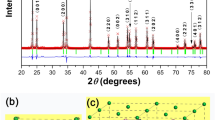Abstract
DISINTEGRATION of vitreous carbon exposed to potassium vapour is thought to result1 from the enhancement—by the formation of intercalation compounds—of stresses already present in the structure. Fischbach2 describes a model of vitreous carbon in which small crystallites of disordered graphite material are bonded by non-trigonal cross-links. It might be expected that such a structure would be reflected in a higher heat of combustion of the material.
This is a preview of subscription content, access via your institution
Access options
Subscribe to this journal
Receive 51 print issues and online access
$199.00 per year
only $3.90 per issue
Buy this article
- Purchase on Springer Link
- Instant access to full article PDF
Prices may be subject to local taxes which are calculated during checkout
Similar content being viewed by others
References
Halpin, M. K., and Jenkins, G. M., Nature, 218, 950 (1968).
Fischbach, D. B., Carbon, 5, 565 (1967).
Hawtin, P., Lewis, J. B., Moul, A. N., and Phillips, R. H., Trans. Roy. Soc., A, 261, 67 (1966).
Author information
Authors and Affiliations
Rights and permissions
About this article
Cite this article
LEWIS, J., MURDOCH, R. & MOUL, A. Heat of Combustion of Vitreous Carbon. Nature 221, 1137–1138 (1969). https://doi.org/10.1038/2211137a0
Received:
Issue Date:
DOI: https://doi.org/10.1038/2211137a0
Comments
By submitting a comment you agree to abide by our Terms and Community Guidelines. If you find something abusive or that does not comply with our terms or guidelines please flag it as inappropriate.



